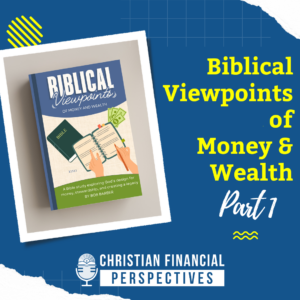Click below to listen to Episode 197 – Biblical Viewpoints Of Money and Wealth Part 1
Subscribe: Apple Podcasts | Google Podcasts | Spotify | Amazon Music | Stitcher | RSS | More
Biblical Viewpoints Of Money and Wealth Part 1
Do you struggle with aligning your view of money and wealth with the Bible or are you looking for a deeper biblical perspective? Over the next few weeks, we’ll dive into a study examining God’s design for wealth and work called “Biblical Viewpoints of Money and Wealth”. The study is a seven-week deep dive into what the Bible says about money and how it applies to real life. It covers topics such as the difference between a Biblical and secular worldview and the responsibilities of an owner versus a manager.
The study is available for purchase on Amazon, but please don’t hesitate to reach out if you are interested in teaching or promoting the study in their churches or small groups.
HOSTED BY: Bob Barber, CWS®, CKA®
CO-HOST: Shawn Peters
Mentioned In This Episode
Bible Verses In This Episode
GALATIANS 5:16-23
So I say, walk by the Spirit, and you will not gratify the desires of the flesh. For the flesh desires what is contrary to the Spirit, and the Spirit what is contrary to the flesh. They are in conflict with each other, so that you are not to do whatever you want. But if you are led by the Spirit, you are not under the law. The acts of the flesh are obvious: sexual immorality, impurity and debauchery; idolatry and witchcraft; hatred, discord, jealousy, fits of rage, selfish ambition, dissensions, factions and envy; drunkenness, orgies, and the like. I warn you, as I did before, that those who live like this will not inherit the kingdom of God. But the fruit of the Spirit is love, joy, peace, forbearance, kindness, goodness, faithfulness, gentleness and self-control. Against such things, there is no law.
PSALM 24:1
The earth is the LORD’S, and all it contains, The world, and those who live in it.
LUKE 16:10-12
The one who is faithful in a very little thing is also faithful in much; and the one who is unrighteous in a very little thing is also unrighteous in much. Therefore if you have not been faithful in the use of unrighteous wealth, who will entrust the true wealth to you? And if you have not been faithful in the use of that which is another’s, who will give you that which is your own?
Want to ask a question about your specific situation? Schedule a complimentary 15 minute phone call.
EPISODE TRANSCRIPT
Shawn:
Do you struggle with aligning your view of money and wealth with the Bible or are you looking for a deeper Biblical perspective? Over the next few weeks, we’ll dive into a study examining God’s design for wealth and work. Let’s get some perspective. Welcome to another episode of Christian Financial Perspectives. My name’s Shawn Peters. I’m joined as always by my co-host, Bob Barber. And today we’re going to be bringing you part one of a three-part series where we give you an overview of a Bible study that Bob had actually developed a number of years ago.
Bob:
Originally this was called the Seven Pillars of Biblical Stewardship. You might remember when we did that and that was so intensive, and I remember when we had Pat Hail here, who was a pastor and he would go in and train churches how to conduct this study.
Shawn:
It was a great study, but the one downside to it is that you kind of almost needed this – teach someone how to teach it for it to be impactful. And I mean, man, how many churches, entire churches actually went through that study? It was quite a few.
Bob:
I think there was 80 to 100 in Texas. So I came up with a simplified version called “Biblical Viewpoints of Money and Wealth” that you can do on your own or you could do in a small group, you just pop right in.
Shawn:
It’s also a seven week study.
Bob:
It is.
Shawn:
But it is written in a way that if you’re on your own or if you’re in a group, you can jump in and it is very scripture heavy and scripture led. So a lot of questions, we’ll give you some examples, but a lot of questions where you have a question and here’s two to four scriptures. Go read the scriptures and then okay, what did the scripture tell you?
Bob:
I guess you could say don’t let the thinness of this fool you. Yeah, because there’s so much scripture.
Shawn:
It’d be about four times as thick if you included all the scriptures.
Bob:
Exactly, yeah. Because it’s very, very scriptural heavy. But if you’re looking for a Bible study that talks about what God’s word says about money and how this applies to real life, this is the study and it’s been years and years of development. The first, like you said, the first series was that Seven Pillars. That was like 10 or 12 years ago. And then this took me another couple of years to come up with this and we’ve had it and we’ve had it out a few years and I think it’s time to bring it back and let our new audience know about this.
Shawn:
So if this ends up being something that you’re interested in, we will have the link in the description or you can just go straight to Amazon and search for “Biblical Viewpoints of Money and Wealth”. And this is what the current cover looks like. So it should be fairly easy to find. But alright, so this seven week Bible study just is a deep dive into what God’s word says about money. The foundation of the study is looking at how Biblical wealth comes from, belongs to, and it should honor God as well as how that wealth should be distributed wisely. Biblical wealth, just kind of a definition, it’s providing for those God has entrusted to us, supporting the church, spreading the gospel, sending out and supporting missionaries, providing for God’s family, feeding the hungry, clothing the poor, sheltering the homeless, healing the sick, educating the homeless, protecting the innocent, and providing for widows and orphans.
Bob:
There’s a lot in there.
Shawn:
It’s a lot. Yeah.
Bob:
But that is probably, that’s kind of a synopsis of the whole study.
Shawn:
Exactly, right there, big picture. So Bob, why don’t you go ahead and let our listeners and viewers know what are the seven viewpoints that are covered within the seven weeks?
Bob:
Alright, well, the first week what we do, and this is really the foundation of the study, is we look at the difference between a Biblical and a secular worldview. And like I say, that’s the foundation. And then the second week we look at the differences between an owner, what an owner’s job is and what a manager’s job is. And we are going to go into some examples of these first three today, two or three minutes just for each one. Week three covers the Biblical worldview of work and retirement. Week four looks at the difference between secular and Biblical council when it comes to finance. Week five covers money and wealth from a Biblical worldview. Week six covers giving and blessings from a Biblical worldview. And then week seven covers properly leaving an inheritance and a legacy for the following generations. So what we’re going to do today for just a few minutes is we’re going to give you an example of those first two to three weeks of this study. And that first week, the scriptures that we use and looking at what’s the difference between a Biblical worldview and a secular worldview – as we look at Galatians of 5:16-23, Exodus 20:1-17, Proverbs 3:3-6, 1 Corinthians 13:4-7, and John 14:6. And hopefully all that, if you’re watching YouTube, this is going to be up on the screen.
Shawn:
Yeah, one correction. It was Exodus 20:1-17.
Bob:
What did I say?
Shawn:
I don’t know, but it wasn’t that.
Bob:
Oh, okay. Well thanks a lot. Yeah, I’m going through all these very quickly. So today, we’re just going to look at the very first scripture and give you an idea of what this feels like. So we’re going to look at Galatians 5:16-23. Shawn, if you would read that for us,.
Shawn:
Starting at verse 16, “So I say walk by the spirit and you will not gratify the desires of the flesh; for the flesh desires what is contrary to the spirit and the Spirit, what is contrary to the flesh. They’re in conflict with each other so that you are not to do whatever you want, but if you’re led by the spirit, you’re not under the law. The acts of the flesh are obvious – sexual immorality, impurity and debauchery, idolatry and witchcraft, hatred, discord, jealousy, fits of rage, selfish ambition, dissensions, factions and envy, drunkenness, orgies and the like. I warn you as I did before, that those who live like this will not inherit the kingdom of God.” In verse 22, “But the fruit of the spirit is love, joy, peace, forbearance, kindness, goodness, faithfulness, gentleness and self-control. Against such things there is no law.” So if you’re doing this on your own, I’m sure you can have a good internal monologue, but definitely in a group, just this first scripture really brings a lot of discussion to the group where we can very clearly see the differences between these two views between the flesh or the world, secular view and the spirit or the Biblical view.
Bob:
If you’re not watching YouTube, but I’m going to show this to you, you can see here what we do is we have one column that we put for the Biblical worldview and another column for the secular worldview. So you write down those and you put ’em right against each other and you’re really able to see a Biblical worldview is love and joy and peace, patience, kindness, gentleness, and self-control where a secular worldview is sexual immorality and discord and anger, all those areas like that. So that really gives you a good idea, and there’s a lot of discussion that goes into this.
Shawn:
That’s right. So then in the second week the study covers the difference between an owner and a manager. The differences between an owner and a manager become clear when you consider examples like a restaurant owner. So the manager has duties and responsibilities to carry out the owner’s wishes. And in the same way, God owns everything and we are merely managers of the resources that he has temporarily given us stewardship over.
Bob:
And we use that example in the study. You think about a restaurant franchise, some people own five or six of them, the owner’s not there, but the manager is. The manager is expected to do a good job for the owner or the manager gets fired.
Shawn:
So examining your personal possessions through this lens, through that lens of that you’re a manager, not an owner, is very illuminating. Whether you’re talking about your car, home, job – in all of those, who’s the real owner? Is it you or is it the Lord? What duties do you have as the manager and how well are you carrying out God’s wishes with these resources?
Bob:
We do that same thing where you put the owner at the top, you list the duties of the owner, you have the manager and you list the duties of the manager. And you can see the differences in the two of those. And looking at Psalms 24:1, which is one of our scriptures, it says God is the owner of everything, “The earth is the Lord’s and all that dwell within it and everything in it.” So it’s really taking that tight fist where it’s all mine and you’re releasing that and saying, God that belongs to you. And then being a good steward. Are you being a good steward with that car that God’s given you? Are you taking good care of it, keeping it clean, things like that. That’s what God wants to see. He wants to see that we’re being good managers with what he’s enabled us. Which brings us to the scripture of Luke 16:10-12. That’s a very important scripture talking about if you wonder why sometimes, why don’t I have more? Well, maybe it’s because you’ve got to do well with the little things first before you do good with the bigger things.
Shawn:
That’s right. So Luke 16:10-12, “The one who is faithful in a very little thing is also faithful and much. And the one who is unrighteous in a very little thing is also unrighteous in much. Therefore, if you have not been faithful in the use of unrighteous wealth, who will entrust the true wealth to you? And if you have not been faithful in the use of that which is another’s, who will give you that which is your own?” To make sure we’re not getting too much into prosperity gospel theology here. Really what this verse highlights is not a guarantee that you’re going to be given a whole lot more, but you look at it as this is a prerequisite to where if you really are expecting God to bless you with more and you have not been faithful with what he’s already given you, why would you expect him to give you more?
So you should also reference the “Parable of the Talents”. The first two, they did well, they both increased the value and then the first one didn’t do anything with it. He just stuck it in a hole, buried underground and it was taken away from him. Well, you need to show that you’re being faithful before you expect God to, for whatever reason, give you more, I think is the main thing there. But it’s not a guarantee either. It’s also okay if he never really gives you any more, we’re still called to be good stewards of what he’s blessed us with.
Bob:
So moving on to week three, and then that’ll be all we cover for today. We explore the Biblical perspectives on work and retirement. There is such a different view. Work appears in the Bible over 500 times, where retirement appears one time and it’s when the chief priests at the age of 50 shall quit their regular duties at the tent of the meeting, but teach. See, they’re teaching. They’re mentoring the younger generation. So retirement is looked at as a time of mentoring others and teaching others, not just checking out of life.
Shawn:
I think the key there is that you’re still active, you’re just in a different phase of your life, different level of responsibility. And keep in mind, work existed before the fall, before sin entered into the world.
Bob:
That is always a good point. And I think people don’t realize that. I mean, they do realize if they go back and read scripture, but they don’t think about it, they think well work is a curse. No, work is not a curse. Work is a blessing. It provides significance. And especially if you’re a Christian, the amount of ministry you can do Monday through Friday at your job is 10 times the amount than you can do on a Sunday morning. I believe in going to church – absolutely – and being with the body of believers. But that’s just a couple of hours where you’re at work 30 to 40 hours a week.
Shawn:
That’s right. So that’s all we’ll cover for today. But the seven modules, if you will, for the study, they build on each other, but they also can, to an extent, stand on their own. Our prayer is that God will use this Bible study in people’s lives to help renew their minds and transform people in how they view and handle money through the lens of how God sees it. So if this study sounds interesting or beneficial to you, we would ask that you consider purchasing your own copy, whether it’s just for yourself or if you wanted to do it with a small group, the link will be in the description. You can also, like I said, we said earlier, go on Amazon search for “Biblical Viewpoints of Money and Wealth”. You can buy however many copies you want. We have it on there basically at cost. We’re not trying to make money on it, we just want to be able to make sure the information’s available, get it out there.
Bob:
And I’m also here if you ever want to just talk about it since I did develop the study. If you want to talk about some ideas about teaching it and promoting it in your church or your small group, please give us a call or text us.
Shawn:
At (830) 609-6986. And don’t forget to share this video with others who might find it beneficial as well. That’s all for today. God bless.
[DISCLOSURES]
* Investment advisory services offered through Christian Investment Advisors Inc dba Christian Financial Advisors, a registered investment advisor registered with the SEC. Registration as an investment advisor does not imply a certain level of skill or training. Comments from today’s show are for informational purposes only and not to be considered investment advice or recommendations to buy or sell any company that may have been mentioned or discussed. The opinions expressed are solely those of the hosts, Bob Barber and Shawn Peters, and their guests. Bob and Shawn do not provide tax advice and encourage you to seek guidance from a tax professional. While Christian Financial Advisors believes the information to be accurate and reliable, we do not claim or have responsibility for its completeness, accuracy, or reliability.












